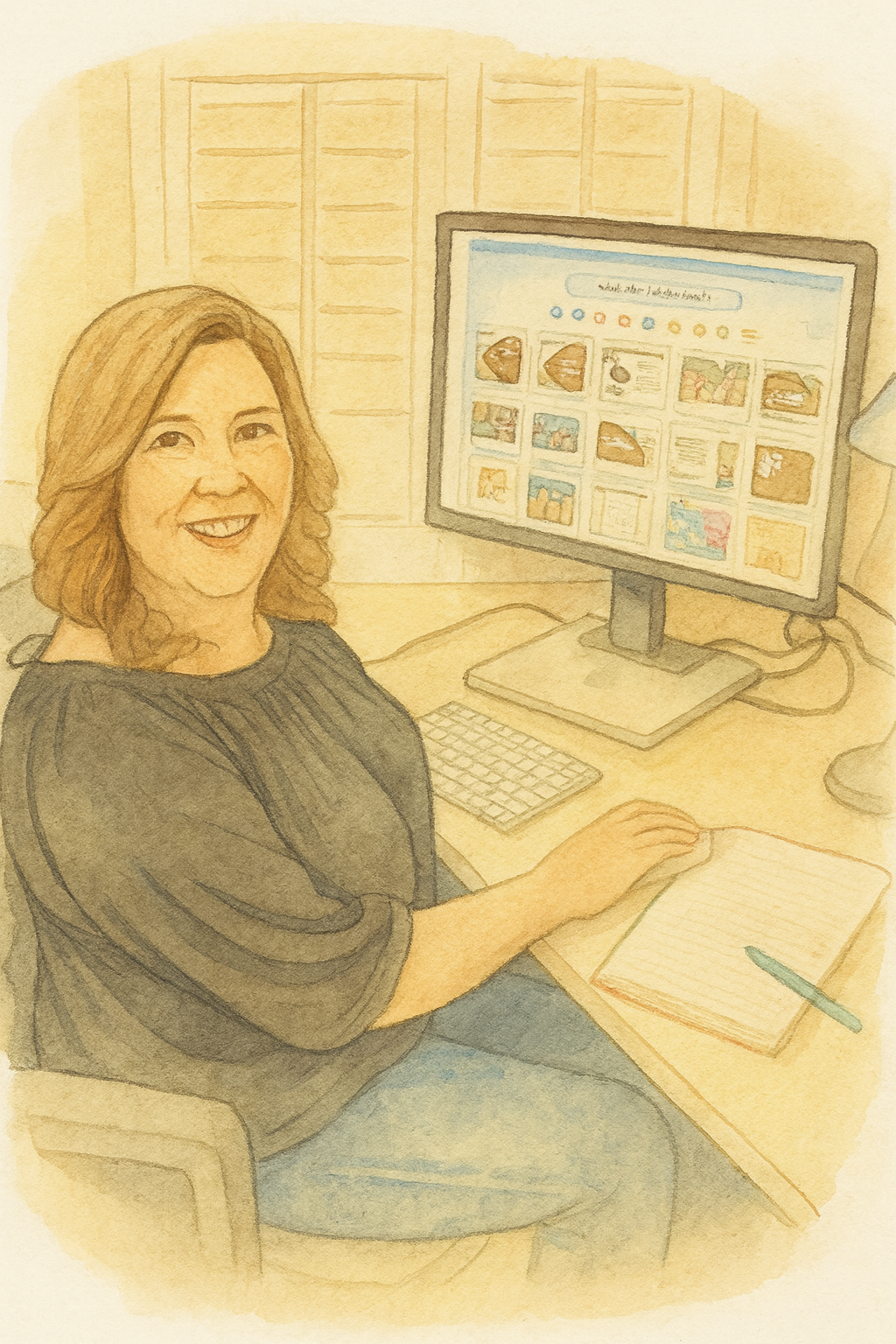How to Raise Kids Who Use Tech Well – Not Just Often – Inspired by Dr Pamela Rutledge, Media Psychologist

Written by Richard – a tech professional who pulls systems apart to understand them, and a dad who wants better than “just say no” when it comes to screens. Inspired by Dr Pamela Rutledge, Media Psychologist, and grounded in what actually works in real families.
You Know That Moment: Screen Time Without Purpose
You walk into the room. Your child has been on their device for what feels like hours. They are watching videos – one after another after another. Or they are scrolling through TikTok. Or they are in a game that, honestly, you do not fully understand. And your instinct is to sigh and think, “Here we go again.”
Your first thought might be to reach over and take the device away. Ban it. Set a timer. Lock it down. Make screen time disappear.
But according to Dr Pamela Rutledge – a leading media psychologist and director of the Media Psychology Research Centre – that instinct, while understandable, might be missing the real point entirely.
“Technology amplifies human behaviour. It is not good or bad – it just reflects who we are and what we do with it.”
— Dr Pamela Rutledge
In other words: the screen is not the enemy. How we use it is everything.
Tech as a Mirror, Not a Monster
Most parents approach technology with fear. We hear scary statistics. We read headlines about screen addiction. We worry about what our children are watching, who they are talking to, and whether their brains are being fried by algorithms.
Dr Rutledge encourages a different mindset: see technology as a mirror for what your child cares about, how they learn, and what they need.
What Your Child’s Screen Use Actually Tells You
- A child building in Minecraft: They are experimenting with design, problem-solving, spatial reasoning, and creative planning. They might spend two hours perfecting a structure – which shows focus and determination.
- A teenager watching YouTube tutorials: They could be learning a skill (coding, music production, art), or they could be exploring identity and creativity through channels they admire.
- Someone scrolling TikTok: Yes, it is algorithm-driven. But it is also a form of social exploration – understanding trends, humour, belonging, and what their peers find funny or important.
- A child gaming with friends online: They are maintaining friendships, collaborating, problem-solving under pressure, and learning how to communicate and strategise with peers.
None of these are inherently “bad”. They are just… what they are. The question is not “How do I stop this?” but rather “What does this tell me about my child?”
The YouTube Problem (And Why Banning It Does Not Work)
YouTube is a particular sore spot for parents. Endless videos. Algorithm loops that keep children watching. Content that ranges from genuinely educational to… well, questionable at best.
Dr Rutledge has thought deeply about this. She explains that the fascination with platforms like YouTube comes from real psychological rewards: curiosity, excitement, emotional connection, and a sense of discovery.
Unboxing videos, for example (which can seem mind-numbingly repetitive to adults), actually trigger anticipation and comfort in children. Watching someone unwrap or discover something stimulates imagination and emotional engagement – similar to storytelling or imaginative play. It is not stupid. It is just different from how adults are wired.
I understand this from my own work taking things apart and pulling systems apart to understand them. Children are doing the same thing mentally – they are deconstructing, exploring, and learning through observation.
So What Should You Do About YouTube?
Dr Rutledge’s answer is not “ban it” but “guide it”. Co-view. Ask questions. Help your child develop awareness.
- Watch a few videos together. Ask, “What do you like about this? Why are you watching it?”
- Help them spot persuasion. Point out when content is trying to sell them something versus when it is purely entertaining. Discuss exaggeration, sponsored content, and marketing.
- Talk about what is real and what is not. Discuss how videos can be edited, filtered, or performed. Help them become media literate, not just media consumers.
- Ask how it makes them feel. Does a video leave them inspired, anxious, jealous, or motivated? That awareness is powerful.
“A generation of anxious parents is buying into fear-based tech restrictions that will not protect kids nor prepare them for the digital world.”
— Dr Pamela Rutledge, Psychology Today
In other words: we cannot bubble-wrap our children from YouTube. But we can help them watch with awareness and critical thinking.
Connection Over Control: The Real Difference Maker
Here is the heart of Dr Rutledge’s parenting philosophy: connection beats control every time.
Children listen more and learn more when they feel seen, not judged. When they feel understood, not policed.
If you sit down beside your child for five minutes and ask genuine questions about what they are doing online – not with suspicion, but with curiosity – something shifts. You are not just monitoring them. You are mentoring them. You are teaching them how to think about technology, not just how to use it.
“Digital parenting is less about managing devices and more about mentoring kids in how to manage themselves.”
— Dr Pamela Rutledge
That mindset encourages trust, communication, and long-term digital confidence. It teaches children that you are a safe person to talk to when something online feels weird or wrong. That is invaluable.
What Connection Looks Like in Practice
- You ask, “Tell me about this game. What is the goal?” and then actually listen.
- You notice they are interested in coding tutorials and say, “That is cool. What are you trying to build?”
- You sit beside them while they game and ask questions instead of criticising.
- You watch a TikTok they find funny and ask why it makes them laugh.
These small moments teach far more than any rule or restriction.
Model the Behaviour You Want to See
Here is the uncomfortable truth: our children watch us as much as we watch them.
If you are constantly scrolling through your phone at dinner, checking emails at bedtime, or half-listening while you reply to messages, your child learns that this is normal. That technology always comes first.
If you put your phone away during family time, if you read actual books, if you model balance and intentionality – they notice that too.
Creating “Tech Sense” Through Your Own Behaviour
- Create “no-phone zones” for everyone. Not just kids – adults too. Dinner table. Family game night. The first 30 minutes after everyone gets home.
- Share when you are using tech for purpose. “I am researching something for work,” or “I am learning how to fix the garden fence by watching a tutorial.” Make intentionality visible.
- Celebrate real-world connection. A walk. A meal together. A conversation with no screens. Show that you value these moments as much as online achievements.
- Be honest about your own struggles. “I got distracted by my phone for too long today. I am going to put it away now.” Children respect honesty far more than perfection.
Transform Screen Time Into Skill Time
Dr Rutledge frames technology not as a trap but as a tool for growth. The question shifts from “How much time are they spending?” to “What are they creating, learning, or building?”
From Consumption to Creation
Create, Don’t Just Consume
- Film a short video or podcast episode
- Learn to code or build something in Scratch
- Create digital art or music
- Write and edit content
- Design a game or story world
When children shift from passively watching to actively making, the screen becomes a tool for expression, not a trap for attention.
Collaborate With Others
- Share a project with friends or family
- Work together on a collaborative game or build
- Join a community around a shared interest
- Teach someone else what they have learned
Technology is at its best when it connects people around shared purpose, not when it isolates people in individual scrolling.
Reflect and Learn
- Talk about what they enjoy and why
- Discuss what they have learned from online content
- Identify skills they are developing
- Celebrate moments when they chose to log off
Self-awareness is the foundation of healthy tech use. Help your child notice their own patterns and choices.
When we help children use technology with curiosity and intention, something shifts. They become more engaged, more creative, more resilient. And they develop genuine digital literacy – not just the ability to use apps, but the wisdom to use them well.
“Technology should make our lives bigger – not smaller.”
— Dr Pamela Rutledge
What “Bigger” Looks Like
- Expanded creativity and self-expression
- New connections and friendships with people who share their interests
- Access to learning and skills they could not access locally
- Opportunities to contribute to communities and causes they care about
- Tools to solve problems and build things that matter
That is the promise of technology. And that is what we should be aiming for with our children.
Beyond the Rules: A Mindset Shift
Most parenting advice about tech focuses on rules: screen time limits, app restrictions, monitoring software. Those have a place. But Dr Rutledge’s deeper insight is about mindset.
Instead of asking “How do I control this?”, ask:
- “What is my child actually drawn to, and why?”
- “What skills are they building, even if I do not recognise them?”
- “How can I help them use this tool more intentionally?”
- “What can I learn about my child from how they spend time online?”
This shift – from control to curiosity, from fear to understanding – changes everything. Your relationship with your child around technology shifts from adversarial to collaborative. And that is when real learning happens.
The Bottom Line: Tech Well Used Is a Gift
Technology is not going away. Your children will grow up in a digital world whether you like it or not. So the question is not how to shield them from it, but how to teach them to use it well.
That means:
- Connection over control. Build trust and curiosity instead of just rules.
- Intentionality over hours. Focus on what they are doing, not just how long they are doing it.
- Creation over consumption. Encourage them to make things, not just watch things.
- Modelling over preaching. Show them how to use technology well by using it well yourself.
- Curiosity over judgment. Ask questions to understand, not to police.
When you approach technology this way, screens become tools for learning, creativity, and connection. And that is something worth teaching your child to use well.
